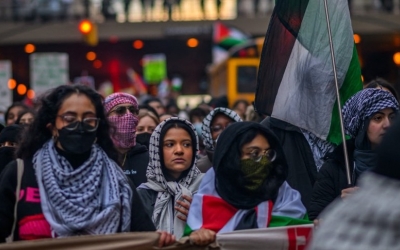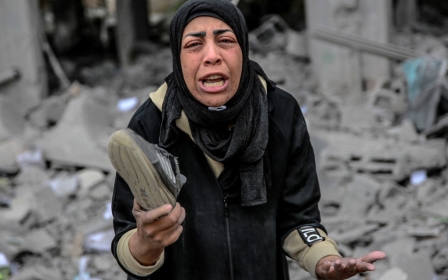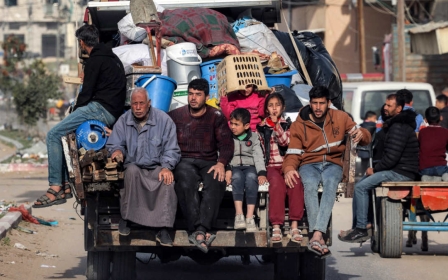US calls for 'immediate ceasefire of six weeks' at UN, as hostage deal talks drag on

The US has revised its draft United Nations Security Council resolution to now call for “an immediate ceasefire” in Gaza, reflecting Washington’s frustration that Israel and Hamas have failed to reach a hostage deal.
The US has changed the wording of a resolution it is floating from calling for “a temporary ceasefire in Gaza as soon as practicable” to “an immediate ceasefire of roughly six-weeks in Gaza together with the release of all hostages,” according to a text seen by Middle East Eye.
The US introduced the resolution after vetoing one put forward by Algeria in February that called for an immediate ceasefire, but failed to condemn Hamas’s 7 October attack on Israel, saying it would derail US-backed talks between Hamas and Israel to reach a hostage deal.
At the time, however, the UN resolution marked the first time the Biden administration had directly called for a ceasefire in Gaza—albeit a temporary one.
Frank Lowenstein, the former special envoy for Israeli-Palestinian negotiations in the Obama administration, previously told MEE that the initial resolution reflected the US’s frustration with Prime Minister Benjamin Netanyahu, calling it “a shot across Bibi’s bow…The Israelis are extremely sensitive about the UN. They view it as a hostile body and rely on the US to protect them there”.
New MEE newsletter: Jerusalem Dispatch
Sign up to get the latest insights and analysis on Israel-Palestine, alongside Turkey Unpacked and other MEE newsletters
Those tensions were on display this week, with Israel claiming that the UN hasn’t done enough to address its own report supporting allegations that Hamas fighters committed sexual violence during the 7 October attacks on southern Israel.
Israel’s foreign minister, Israel Katz accused UN Secretary-General, Antonio Guterres of responding with “silence” to the global body’s report and recalled Israel’s representative to the UN, Gilad Erdan, for consultations, in protest.
US leverage shifts by millimetres
Calling for an immediate ceasefire of roughly six weeks, would be a further step up for the US, and follows Vice President Kamala Harris’ demand that Israel and Hamas agree to a six-week ceasefire on Sunday.
The US has vetoed three resolutions calling for an immediate ceasefire since the war in Gaza erupted on 7 October and also blocked a separate amendment calling for a ceasefire in December.
The painstaking, gradual change in language by the Biden administration reflects its attempt to nudge Israel to halt Gaza fighting by millimetres.
That approach is a far cry from the call of progressives in the Democratic Party who want Biden to demand an immediate ceasefire without conditions and condition arms sales to Israel.
Progressives, along with Arab and Muslim Americans, have voiced their frustration with Biden at the ballot box, casting “uncommitted" votes in big numbers in the Democratic primaries in Michigan and Minnesota.
But as Biden gears up for a rematch against former President Donald Trump, it's unclear whether he would be willing to endure the backlash from Israeli lobbying groups, independent voters backing Israel and Republicans in swing states by chastising Israel more forcefully.
'Very dangerous'
As the fighting in Gaza grinds on, it has seeped out beyond Gaza's borders, morphing into a shadowy proxy contest between Tehran and Washington over who calls the shots in the Middle East.
In Yemen, Houthi rebels are waging war against commercial shipping, in what they say is solidarity with Palestine. Israel is exchanging near-daily fire with Hezbollah along the Lebanese border and Iran-backed groups in Syria and Iraq are attacking US forces.
The incremental change in language at the UN underlines the Biden administration’s policy of maintaining support for Israel while ensuring it is in the driver's seat of brokering a hostage deal.
US officials hope the agreement can be transformed into a ceasefire that would allow for time to reform the secular Palestinian Authority until it can take over governing the Gaza Strip.
But Prime Minister Benjamin Netanyahu’s government has resisted attempts to strengthen the PA and publicly ruled out any talk of a return to negotiations on a two-state solution.
The Biden administration’s approach to the war risks a new challenge with talks dragging out between Israel and Hamas over a six-week ceasefire. The negotiations have passed President Biden’s own assessment that a truce would be in place by Monday.
He warned that a ceasefire needed to be reached within days saying “if we get into circumstances where this continues to Ramadan, Israel and Jerusalem could be very, very dangerous”.
The Islamic holy month of Ramadan is set to start around 10 March.
Negotiations were brokered by Qatar and Egypt in Cairo, but Israel did not send a team to take part. According to a report in the Wall Street Journal the talks are deadlocked over Israel’s refusal to allow adult men to return to their homes in northern Gaza during the truce and Hamas’s demand that any ceasefire be permanent.
Middle East Eye delivers independent and unrivalled coverage and analysis of the Middle East, North Africa and beyond. To learn more about republishing this content and the associated fees, please fill out this form. More about MEE can be found here.






